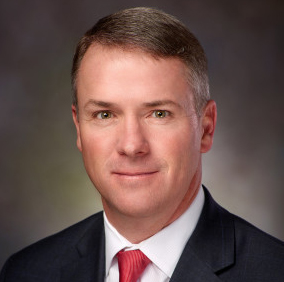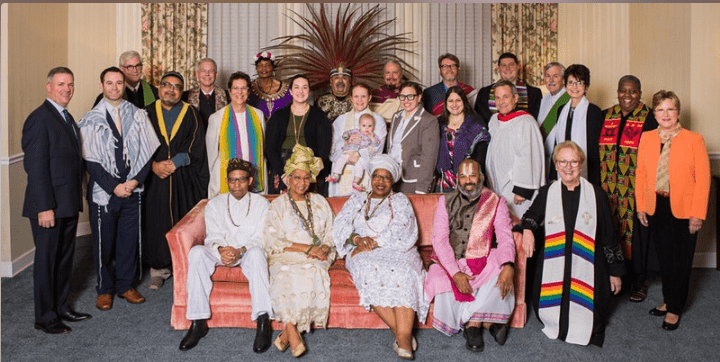By heritage, Kyle Reese is as Baptist as they come.
He earned degrees from a Baptist university and two Baptist seminaries. He served as pastor of Baptist churches in Texas and Florida and is past moderator of the Cooperative Baptist Fellowship.

Kyle Reese
But the community Reese now serves consists not only of fellow Christians but of Jews, Muslims, Bhai and other faith groups dedicated to diversity and inclusivity in Northeast Florida.
“I feel a real calling to this community and to help make Jacksonville a better place,” said Reese, who was appointed executive director of OneJax July 1.
He served as the organization’s deputy director for a year leading up to the appointment, and before that on its board, including as chairman, since about 2011. Previously he served as senior pastor of Hendricks Avenue Baptist Church in Jacksonville, to which he was called in 2006.
Reese said he has by no means abandoned his Baptist identity with the move. As past moderator of CBF, Reese remains involved in the Fellowship’s Toward Bold Faithfulness initiative and serves on the board of Baptist Medical Center Jacksonville. He served nine years on the board of Baptist News Global, including six as chairman.
But Reese said he has been steadily drawn into involvement in the region’s interfaith community. He co-hosted and participated in public radio programs involving clergy from various faiths. His church regularly hosted interfaith worship services around Thanksgiving.
Leading OneJax, he said, has pastoral dimensions.
“It’s all about relationships,” he explained. “I have relationships with the board of directors. I have relationships with my staff colleagues. And I feel a sense of stewardship for the gifts our organization brings to the table in Jacksonville. I very much feel this is a ministry.”
Reese spoke with BNG about the direction he sees his calling taking him.
When did it start to dawn on you that you might want to be something other than a board member at OneJax?
For me it was looking at Hendricks Avenue’s evolving needs and what I bring to the table. I had the dawning realization that the church needed new leadership, and that I could either retool how I did things or step aside for someone else. Then I had the opportunity to talk to a congregation in Texas, but I declined to take that opportunity. So, next I started to ask: What does this mean for my vocation? And all this time I really felt called to Jacksonville. I have a lot of relationships here, and it’s been a great privilege serving the community. I knew this opportunity with OneJax was a possibility, so I pursued it.
What is OneJax, and what is its mission?
We are an interfaith group that is celebrating its 50th year. We began as part of the National Conference of Christians and Jews. Over the years we have expanded into significant work with youth, which includes our diversity-focused summer camps that we call Metrotown. These are for high school and middle school students. We also have Project Breakthrough, which is a collaborative effort to examine the effects of structural racism. More and more we are doing that in the corporate setting, given the things that are happening in our country. We do community suppers with the Chamber of Commerce to bring different people together to talk with one another and listen to each other. Basically, we are about building community.
Do you know if you are the first Baptist to lead the organization?
I believe I am.
Do you spend a lot of time explaining what CBF and the moderate or progressive Baptist movements are? Are people surprised to learn these exist?
Yes to both. I spend a bit good amount of time doing that, actually — a lot of time trying to explain that background to people.
At what point in your career did you begin developing an interest in ecumenical and interfaith dialogue, and who modeled that for you?
I would say the seeds of that were planted in seminary during those times we discussed the missional church. The message that always struck me from those conversations is that the church exists for the community, and would this community be any worse off if your church did not exist. And jumping into Jacksonville, a much larger community with greater diversity, was also part of it. And Jack Snell (former senior pastor at Hendricks Avenue and former director of global field personnel for CBF) was an inspiration for me.
For a time you were a member of the “God Squad” radio program in Jacksonville. What was that about?
That started with Melissa Ross and First Coast Connect when she put together a group of people who she would interview when there was any local or national issue regarding religion. It was me and Parvez Ahmed (former chairman of the Council on American-Islamic Relations) and Nick Louh (Greek Orthodox priest) and Rabbi Joshua Lief. Those were good and fun days being with that group.
What are the major initiatives or issues facing OneJax today?
I would say Project Breakthrough. There are lot of conversations about structural racism and how to dismantle that in our community and in our country. We are spending a lot of time focused on those conversations. We also spent the last year engaged in a study around an initiative for spirituality, faith and health for clergy. We will form a focus group after the first of the year that will have access to a dietician, a personal trainer and pastoral counselors because clergy are always under stress, regardless of faith tradition.
It sounds like OneJax was prepared when the deaths of George Floyd and other police-related killings occurred.
We had the infrastructure in place to respond when those things happened. The challenge has been to make it happen. To do that we spend our time in the civil discourse space. It’s a real challenge. The Trump presidency is a sort of a one-off. It’s not just about bringing Republicans and Democrats together for dialogue. The focus is on a much wider spectrum of people attending civil discourse events to listen to one another.
Where are you going to church these days?
I am an online worshiper of the Hendricks Avenue Baptist Church, but this past Sunday the internet was down so I went to the National Cathedral, which was delightful.
Do you see yourself back in a pulpit some day?
Yes, in a supply sense. I love the church. I didn’t leave because I was tired or because I was angry or because I had to. This was just the next phase of my calling. I’m actually consulting with a church right now and I would love for preaching opportunities to happen. I will be working with the Center for Healthy Churches due to that.
What is your current involvement, as past moderator, with CBF?
I remain involved, including through the Toward Bold Faithfulness initiative. We continue to take the findings of that process and operationalize them in the life of CBF. It is a joy to work with (CBF Executive Coordinator) Paul Baxley. He is the exact, right person to lead us now, and he is leading us well.
Related articles:
Jacksonville interfaith group promotes dialogue as response to mass shootings
Not all evangelicals afraid of dialogue, Muslims and Christians say
Reese to become CBF moderator-elect at Dallas General Assembly

